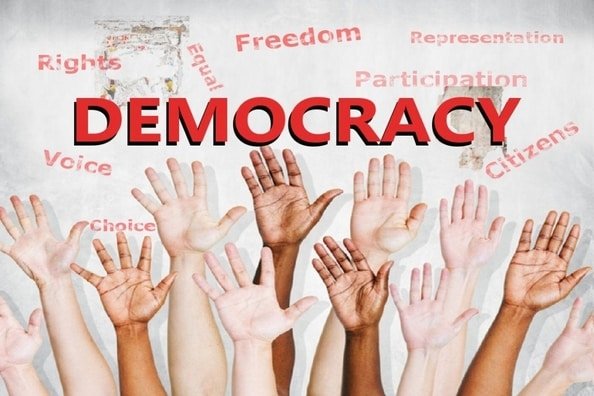Back to: GOVERNMENT SS1
Welcome to class!
In today’s class, we will be talking about democracy. Enjoy the class!
Democracy

Democracy is defined as a form of government in which people exercise their governing power either directly or through representatives periodically through elections. Therefore, democracy can be said to provide an institution for expression and supremacy of a people.
The origin of democracy is traceable to the ancient Greek. The word ‘demo’ means people and ‘kratia’ means government. ‘Demo&kratia’ was then metamorphosed into democracy. Abraham Lincoln defined it as the government by the people of the people and for the people.
This definition could be broken down into 3 parts with a relevant explanation.
- Government of the people: this refers to the government on behalf of the people
- Government by the people: this refers to a government that has proper representation
- Government for the people: it is carried out by people of high principle that can be trusted with the affairs of the government. They should not be politicians who seek to make themselves powerful and rich at the expense of those they serve- the people.
The rise of democracy
The French revolutionary (1989 and the outbreak of the great, world war 1914) are remarkably in the history of government for development which is the rise of democracy and that of nationalism. However, our main focus here is on democracy and the developments may be traced to 4 factors namely; socio-economic and political conditions, historical writings, bad government and imitations.
Main features of democracy
- Political liberty: it is an indispensable factor. The equal rights of all normal adults to vote or be voted for in an election and equal eligibility for political office.
- Value of individual personality: in a democracy, the belief in the value of an individual personality is restored. It implies the need to respect other men to cancel his argument and take to his point of view.
- Free association with groups: people should be able to choose their candidate or support political parties and solicit for support for their programmes.
- Political parties: when democracy is optional there is more than one political party with different individuals competing for power.
- Free association and periodic election: these are some of the essential parts of democracy. They make possible an alternate government.
- Secret ballot: in popular democracies, elections are usually done by secret ballots.
- Decision making
- Provision of opportunity
- Universal adult suffrage: the voting of both male and female adults in a democratic process.
- Separation of powers
Types of democracy
- Direct democracy: it refers to an ideal government by which all the citizens meet together periodically to discuss issues affecting the community. This is a simple system suitable for small states only the village or the community must be very small, usually not more than a few thousand people.
- Indirect democracy: this form of government comes in where citizens are qualified to choose their representatives to rule on their behalf.
The merits of democracy
- Free choice of leaders
- Equal opportunity
- Stability
- Legitimacy
- Operation of the rule of law
- Equality of individuals
- Participation in the governance of affair
Demerit of democracy
- It leads to slow decision making
- Expensive to operate
- Incompetent people may be in the government
- The idea of democracy involves the representation of self-minded individuals
- Ignorance of political education and the rule of law
Conditions necessary for a successful democracy
- Good government
- Willingness
- Enlightenment
- Rule of law
- Openness
- Tolerance
- Opposition
- Independence of judiciary
- Free and fair election
- The supremacy of the constitution
Pillars of democracy
Pillars of democracy are the factors that contribute to the smooth running of democracy in other words, pillars of democracy are the people and those institutions that gives the needed support, the sustenance and good running of the democracy in countries like Nigeria, pillars of democracy are important as pillars supporting a house; These pillars are:
- The people
- Democratic institution
- The rule of law
- Transparent el
- Electoral process
- Majority role
- Minority right
In our next class, we will be talking about Communism, Socialism and Capitalism. We hope you enjoyed the class.
Should you any further question, feel free to ask in the comment section below and trust us to respond as soon as possible.

i enjoy the clas
I like the class
I love this class
I love the class
Excellent
I love this class